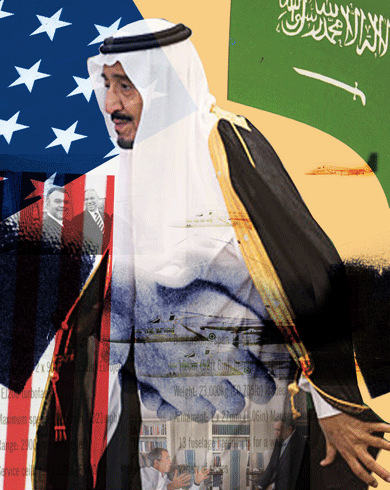Meeting with the leaders of NATO countries in May, President Trump chastised them sternly for their shortcomings as allies. He took the time, however, to make respectful reference to the ruler of Saudi Arabia, Salman bin Abdulaziz Al Saud, whom he had just visited at the start of his first overseas trip as president. “I spent much time with King Salman,” he told the glum-looking cluster of Europeans, calling him “a wise man who wants to see things get much better rapidly.”
Some might find this fulsome description surprising, given widespread reports that Salman, who took the throne in January 2015, suffers from dementia. Generally seen wearing a puzzled look, the king has been known to wander off in the middle of conversations, as he reportedly did once while talking with President Obama. When speaking in public, he depends on fast-typing aides whose prompts appear on a discreetly concealed monitor.

Illustrations by Darrel Rees. Source photographs: King Salman bin Abdulaziz Al Saud © Bernd von Jutrczenka/dpa/Alamy; Prince Bandar bin Sultan, Saudi Arabia’s ambassador to the United States, and U.S. Secretary of State Colin Powell, September 20, 2001 © David Hume Kennerly/Getty Images; President George W. Bush and Prince Bandar bin Sultan, August 27, 2002 © Eric Draper/The White House/The New York Times
Whatever wisdom Trump absorbed from his elderly royal friend, the primary purpose of his trip to Riyadh, according to a former senior U.S. official briefed on the proceedings, was cash — both in arms sales and investments in crumbling American infrastructure, such as highways, bridges, and tunnels. The Trump Administration is “desperate for Saudi money, especially infrastructure investments in the Rust Belt,” the former official told me. An influx of Saudi dollars could generate jobs and thus redound to Trump’s political benefit. As a cynical douceur, the Saudis, derided by Trump during his campaign as “people that kill women and treat women horribly,” joined the United Arab Emirates in pledging $100 million for a women’s-empowerment initiative spearheaded by Ivanka Trump. A joyful president took part in the traditional sword dance and then helped launch a Saudi center for “combating extremism.”
This was not the first time the Saudis had dangled the prospect of massive investments to leverage U.S. support. “Mohammad bin Salman made the same pitch to the Obama people,” the former official told me. “ ‘We’re going to invest all this money here, you’re going to be our great economic partner, etc.’ Because the Trump Administration doesn’t know much about foreign affairs, they were really seduced by this.”
The president certainly viewed the visit as a huge success. “We made and saved the U.S.A. many billions of dollars and millions of jobs,” he tweeted as he left Saudi Arabia. The White House soon trumpeted $110 billion in weapons sales and billions more in infrastructure investments, with the total purportedly rising to $350 billion.
Yet amid the sword dances and flattery, a shadow lingered over the occasion: 9/11. After years of glacial legal progress, the momentous charge that our Saudi allies enabled and supported the most devastating act of mass murder on American soil may now be coming to a resolution. Thanks to a combination of court decisions, congressional action, and the disclosure of long-sequestered government records, it appears increasingly likely that our supposed friend and peerless weapons customer will finally face its accusers in court.
Read the full story here.


